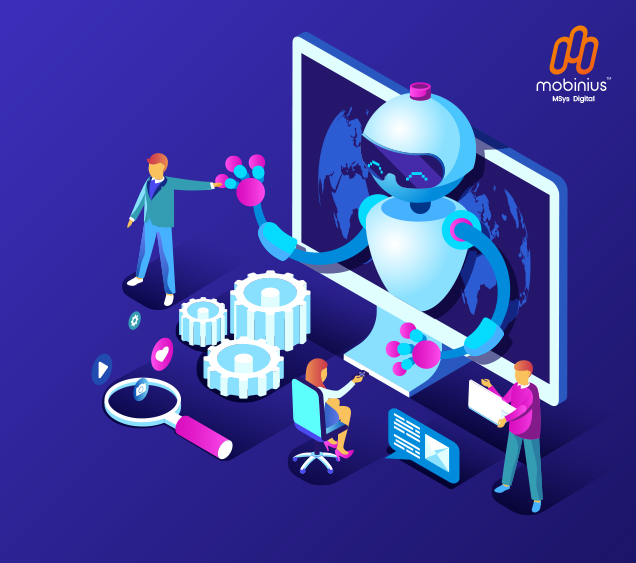How is AI & Machine Learning Solutions Revamping the Fintech Sector?
Audio : Listen to This Blog.
Ever thought about how facial recognition activates to unlock our smartphones? How does the music application suggest music to us? How fraud detection and credit scores are analyzed? And so many ingenious technologies that we deal with in our daily lives.
Perhaps, a few of us were curious to know the real reason behind such intelligent software until we met the real game-changers. Right?
The use of artificial Intelligence enhances outcomes. It incorporates techniques derived from various forms of human intelligence at a scale that is ahead of human intellect.
A quick takeaway- Artificial intelligence and machine learning technology have risen from the verge to the tech deliberation’s bullseye.
Which sector has the massive datasets, workforce, and capital to leverage uses of artificial intelligence? It is the Financial Sector.
However, prior to the emergence of AI in FinTech, only a few industry giants could cope with the genetically calculable nature of our technoid planet.
Not to forget, the Financial sectors were among the first to implement the mainframe computer and relational databases and have been eagerly anticipating the next level of computing capacity.
We researched these real-world use cases of AI in Fintech to show how artificial intelligence has revolutionized the FinTech industry. The financial sector is one of the few verticals that are a great fit for the enhanced capabilities introduced by the most revolutionary Artificial Intelligence trends.
Impact of Artificial Intelligence and Machine Learning Applications
Artificial Intelligence Trends and Machine Learning applications are reforming the industry’s achievement.
The fintech industry is getting stronger despite the pandemic crises (though it impacted a few businesses). But the companies have already started to strengthen their shrewd business models with the most advanced technology.

This calls for determining what is best for the customers and, as a result, achieving high levels of customer satisfaction by integrating Artificial intelligence in business.
Hopefully, you must have got some inspiration from the Impact of artificial intelligence.
Let us have a look at Potential use cases of Artificial Intelligence in the Fintech industry.
Better Financial Decisions
Before the introduction of AI in Fintech, it was not so easy to process complicated information.
Fintech applications are developing new and creative ways in which users can process even the most complex data. Thanks to the power of data visualization tools, apps can transform complicated data into comprehensible insights.
Insurance leaders & banking agents can input their queries instead of asking human experts, resulting in data-driven management decisions at a lower cost. Machines will then analyze the data and provide recommendations, which will aid the users to make use of complex information to improve their financial decision-making.
Regulatory Compliance, Fraud Detection, and Security
The technology aims to provide ease and enhanced speed. However, with digital transformation, there are quite high chances of online fraud and financial crimes.
Now that we know that AI is a pioneer in detecting online fraudulent cases. Therefore to combat fraudulent transactions, Fintech companies & financial institutions are swiftly investing in AI and machine learning solutions
These analytics tools gather facts to analyze data, required for crucial decision making. Artificial Intelligence systems then learn and track user behavior patterns to spot unusual fraud attempts and incidences.
Read More : “Recognized as Top AI Development Company by GoodFirms“
Algorithms can detect suspicious activity and, even better, warn users. Since these technologies can continuously track suspicious trends, there is no need to be alert 24 hours a day. Users can keep updated on what’s going on behind their backs while remaining assured that their assets are safe.
Claim Management
Machine Learning technology may be used to improve claim management at various stages of the claim handling process. Insurers can simplify handling mechanisms by using Artificial Intelligence Trends and handling a large volume of data in a short period. It can also expedite such claims, reducing total processing time and handling costs while improving customer satisfaction.
These algorithms look for trends in data to aid in the detection of fraudulent claims. AI systems can then adapt to new undetected cases and improve detection over time thanks to their self-learning abilities.
Automated Customer Support
Customer service is important, but often ignored, application of AI in FinTech. Apart from health and safety, no other aspect of people’s lives is more crucial than their financial well-being.
Chatbots are now a major player in the virtual industry, and they’re quickly gaining traction in banking services too. Customer-facing applications like AI interfaces and Chabot may provide helpful guidance while cutting payroll costs.

Furthermore, the uses of Artificial Intelligence can help in automating and streamlining back-office operations.
Customers’ preferences are driving the demand for cheaper, safer, and personalized services. The Fintech industry has benefited from automation in terms of customer support and experience.
Automated Book Keeping Systems
Back-office work is an endless series of tasks that eat up a lot of precious business time and can easily intrude on small business owners. AI-induced automated recordkeeping solutions can help business owners with back-office operations such as accounting and payroll management.
Read More : “Leveraging Customer Experience Using AI & ML Driven Technologies“
The system automatically classifies transaction patterns and categorizes expenditures using a combination of machine learning technology and custom rules, procedures, and calculations. Robotic Process Automation (RPA) automates a wide range of routine activities, including data extraction, document capture, regulatory compliance, and cash flow.
Client Risk Profile
Classifying the client’s profile is crucial for quick data analysis. Fintech companies need to be able to classify clients using data analysis and related trends/patterns. AI tools have shown to be extremely useful in automating the process of profiling clients based on their risk profile. This profiling work aids experts in making correct and automated product recommendations to consumers.
Enhanced Trading and Asset Management
Investment funds have always relied on complex algorithms to create reliable forecasts & simulations. As a result, the asset management industry has been able to rebuild many of its procedures and create new products and services. FinTech firms have seen this and are incorporating these solutions into applications so that consumers can profit from them.
Automation and machine learning solutions are becoming more common in the Fintech industry due to their potential benefits. Smart wallets, for example, learn and track their users’ behavior and activities. So that they can provide accurate information about the customer transactions.
Fintech companies are collaborating with growth and technology leaders to create innovative, efficient, and customized concepts. Artificial intelligence, artificial learning, and related technology are helping financial institutions develop their skills, increase customer loyalty, boost profits, and lower expenses.
Predictive Analytics and future forecasting
Another benefit of artificial intelligence in business is predictive analysis.
It is beneficial for increasing revenue, maximizing resource use, and improving operating productivity.
Businesses may use machine learning algorithms to efficiently collect and evaluate large data sets to make quicker and more precise predictions of future financial market developments. As a result, they will provide consumers with tailored solutions.
Treasury experts rely on accurate cash forecasts to adequately finance their distribution accounts, make timely investment decisions, manage target balances, and comply with all regulatory requirements.
Read More : “Artificial Intelligence|Machine Learning and Their Smart Applications“
Even the most qualified human specialist cannot predict external factors or account for the plethora of variables needed for exact connection and regression analysis.
Automated Virtual Financial Assistant
Automated financial assistants help users to make financial decisions like events tracking, stock and bond price patterns based on the user’s financial objectives, and personal portfolio. This helps the users in recommending bonds and stocks to purchase or sell. These systems, commonly named “Robo-Advisors,” are continually being provided by both existing financial institutions and start-ups.
Conclusion
Emerging technologies such as artificial intelligence and machine learning solutions will continue to be essential for the Fintech industry as the market demands simpler and faster transactions.
For more information on how we can help you leverage your technologies, feel free to reach out to us here.
Contact us
AI and ML are potent tools that are incredibly useful to ease complex tasks. And therefore, greatly empowering the Fintech sector. As a result, financial institutions are now able to provide superior financial services to their clients.
Leading financial and banking companies around the world are leveraging the features and benefits of Artificial intelligence to make business more reliable and automated.
If you believe your FinTech app will profit from incorporating the benefits of Artificial Intelligence in business or Machine Learning applications reach us out at marketing@mobinius.com. We will certainly assist you in getting the most out of it.
FAQ's
AI would enable banks to concentrate on their customers by allowing them to gain critical insights from the data they already have. By analyzing data to deliver real-time recommendations, banks would be able to personalize, and improve the consumer experience, making it as easier as feasible.
- Improved the user experience using chatbots
- Personalized marketing
- Provide accurate information.
- Improved dark social media sharing.
- Predictive analytics guides better content creation.
The current artificial intelligence trends are AI customer service and assistance, data access that enables pervasiveness, predictive analysis, improved customization, real-time marketing programs, and AI-powered chatbots.



